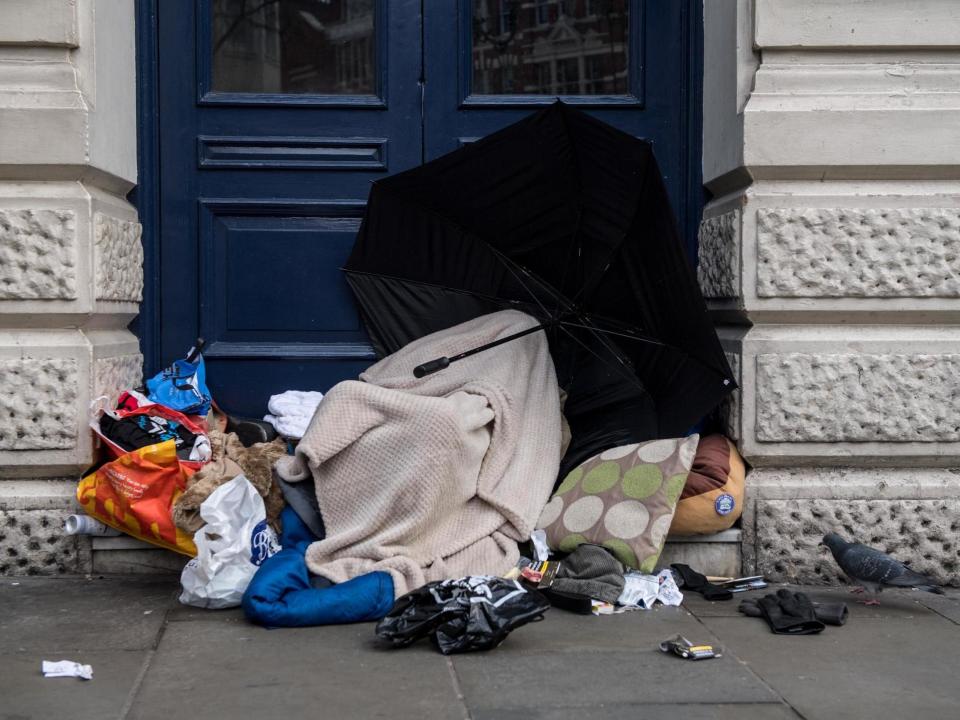Government says rough sleeping down 9 per cent to 4,266, despite figures suggesting more than 28,000 homeless across UK

New government figures show rough sleeping fell by 9 per cent in a year – but campaigners have urged caution over the “misleading” data which they say underplays the true scale of the problem.
Official statistics published on Thursday estimate that 4,266 people were sleeping rough on a single night in autumn 2019, down by 411 people from last year but up by 141 per cent since 2010.
The figures suggest the number of people estimated to be sleeping on the streets of in London has decreased for the first time in six years, down by 11 per cent – the largest fall in a decade.
However, separate data obtained through Freedom of Information (FOI) requests to local councils indicate that rough sleeping is in fact around 556 per cent higher than the official statistics suggest – showing that nearly 28,000 people slept rough in 2019.
Shadow housing secretary John Healey said: “Any apparent fall in street sleeping is welcome but everyone knows these misleading statistics are an unreliable undercount of the true scale of the problem.”
He added: “Even on these partial figures, the government is still set to break its own pledge to end rough sleeping by the end of the parliament, which it isn’t set to achieve until 2037 at the current rate of progress.”
Data obtained by the BBC through FOI requests to local councils revealed more than 28,000 people were sleeping rough in the latest year on record – considerably higher than the 4,266 figure cited by the government.
The government said Healey’s claim that the figure was misleading were “completely untrue” and argued it was “factually inaccurate” to the compare official figure with the FOI data.
It comes as new research shows councils in England spent £1bn less on services supporting single homeless people last year compared to 2008/9, while being forced to spend more than they did 10 years ago on temporary accommodation for homeless families.
A WPI Economics report, commissioned by homelessness charities St Mungo’s and Homeless Link, reveals total council spending on all homelessness related activity fell from £2.9bn in 2008/9 to £2.2bn last year – a reduction they said was forcing people onto the streets.
The prime minister announced on Wednesday, the day before the new figures were published, that he was allocating an extra £236m to help get people off the streets and appointed an independent adviser to lead an urgent review into the causes of rough sleeping.
Boris Johnson said the new funding would go towards offering “move on” accommodation for up to 6,000 rough sleepers and those at immediate risk of rough sleeping, to give them stability and certainty over the long-term.
Howard Sinclair, chief executive at St Mungo’s, said that new initiatives so far had been “wholly insufficient” to tackle the causes of homelessness and the funding announced by Mr Johnson was “simply not enough and too short term”.
“After a decade of cuts and rising homelessness, the government must act now to put back the £1bn to bring back the vital services that have been lost. With 726 people dying on our streets or while homeless in a year, this really is a matter of life and death,” he added.
“Without this urgent action [the government] will inevitably miss their target to end rough sleeping by 2024. It can only do this by committing to a programme of guaranteed, long-term funding, so that everyone can find and keep a home for good.”
Pam Orchard, chief executive of homelessness charity the Connection at St Martin’s, said a shortage of housing, changes to benefits and cuts to both mental health and addiction services were creating a “perfect storm” that had led increasing numbers of people to fall into rough sleeping.
She told The Independent that helping people sleeping on the streets was complicated and required “wraparound” approach.
“The temptation when there are so many sleeping rough is to think that if you give people a meal and if people go into some kind of temporary accommodation that will address the problem, but that’s really only the beginning,” she said.
“If people are sleeping rough there are a whole complex range of reasons why that’s happened and we need to deal with the symptoms but also the causes.”
A spokesperson for the Ministry of Housing, Communities and Local Government said: “Our figures are independently verified by Homeless Link – a leading homeless charity – and the UK Statistics Authority has said our method is the most comprehensive available.
“The two figures aren’t comparable and it is factually inaccurate to suggest otherwise.”
Read more
Homelessness five times worse in UK than government admits
Johnson recruits former homelessness czar for review of rough sleeping
Someone becomes street homeless in London almost every two hours
Rough sleeping in London hits record high, figures show

 Yahoo News
Yahoo News 